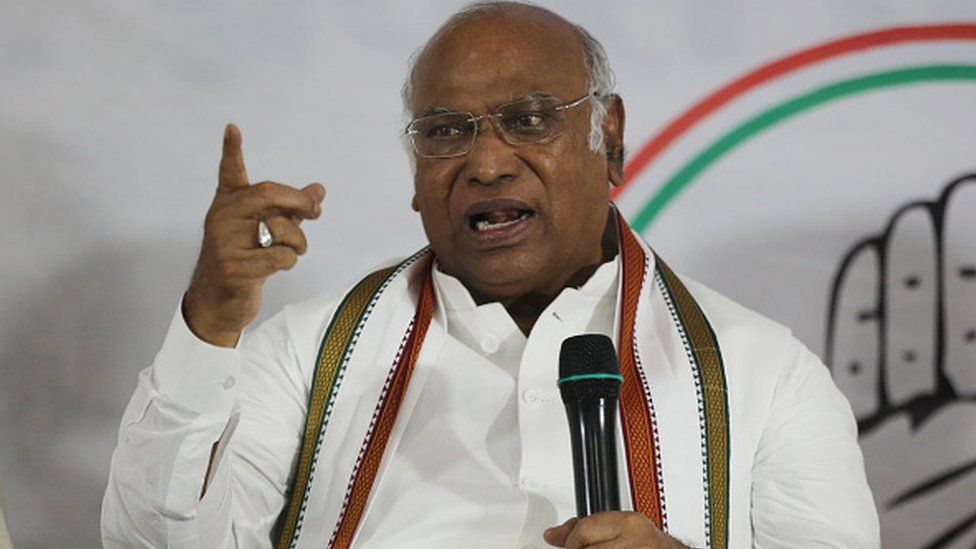
by Nilofar Suhrawardy 21 October 2022
Nothing is surprising about speculations and questions being raised about the democratic nature of Mallikarjun Kharge’s election as President of the Congress Party. Prior to the results being officially declared, Kharge’s victory was viewed as “certain” as the party’s “official candidate.” He won 7,897 votes against 1,072 secured by his rival Shashi Tharoor out of 8,969 votes. Of 9,385 votes 416 were declared invalid because of errors such as incorrect marking. Ahead of being elected Kharge had dismissed the tag of “official candidate” attached to his name as a creation of media. His decision to contest elections, according to him, was based on the suggestion of senior party members. The nature of his victory is also described as that of party leaders and stalwarts’ favored candidate.
Nevertheless, the fact that Kharge has been formally elected cannot be ignored. Equally significant is that Tharoor was not pressurized to step back from contesting for this post. His being able to secure nearly 12% of party votes bears its democratic significance. Congress has gone through this process- that of its President’s election- after around 22 years. True, despite Kharge’s election, key cards are likely to continue being exercised by Sonia Gandhi and Rahul Gandhi. Nevertheless, Kharge’s election is probably indirectly an attempt to burst a much often used card by political rivals of the Congress party- that of labelling its control by one family and viewing Sonia as a “foreigner.”
Interestingly, a comparison of Kharge and Tharoor’s political backgrounds places the former on the firmer democratic ground. Prior to his joining the political field, Tharoor’s career was primarily linked with external affairs, including United Nations. Kharge’s career began at the grassroots as a union leader, leading agitations and fighting for the legal rights of labor unions. Kharge began his political career in 1972, winning elections to Karnataka Assembly. He continuously won Assembly elections as a member of Congress till 2008. He joined Lok Sabha in 2009. He retained his Lok Sabha seat in 2014 but lost it in 2019. Tharoor began his electoral battle in 2009 by winning the Lok Sabha elections. He succeeded in 2014 and also in 2019.
Democratically, Kharge is clearly more firmly in grips with grassroots politics, as suggested by his background. Diplomatically, of course, Tharoor ranks higher than him. But then the same cannot be said about Kharge and Tharoor’s democratic reach, down to the grassroots. Strong regional roots of both from their respective constituencies can certainly not be ignored. It is possible, at present, Kharge bears greater political importance, regionally as well as at other levels for Congress than Tharoor. Karnataka is headed for assembly elections within less than a year, and that of Kerala is scheduled in 2026. In addition, the election of Kharge – a Dalit- as Congress President may prompt Dalit votes to favor Congress in elections to Karnataka Assembly and also in 2024 parliamentary polls. Scheduled Castes comprise roughly 17% of votes in Karnataka. Kharge’s success in turning the tide in his party’s favor by winning over their support may play a major role in earning their votes in Lok Sabha elections and perhaps other states’ assembly elections.
Given his political background and committed loyalty to Congress, party stalwarts are probably hopeful that Kharge will play a key role in reviving the party’s diminishing fortunes, beginning with Karnataka Assembly. Undeniably, Tharoor’s loyalty toward Congress also remains unquestionable. Irrespective of whether Kharge was the party’s “official nominee” or not, the political reality responsible for his success cannot be ignored. His political background now bears greater electoral importance for Congress than that of Tharoor.
The message conveyed by substantial noise being made about key reins of Congress being retained by Gandhi family despite Khagre being elected the party chief cannot be ignored. If Gandhis choose to step back totally, the national image and reach of their party are likely to be negatively affected. It needs to be noted, Kharge’s political importance and image are not the same at the national level as it is within Karnataka. Besides, it would be prudent for Gandhis to remain, key commanders, as any other move may lead to intra-party bickering and perhaps a greater decline of the party. Congress loyalists in Karnataka may be pleased about Kharge being the party chief, but the same cannot be said about party members in other states.
The preceding point needs to be reconsidered from another angle, that is democratic. Well, the Congress has at least given Kharge the opportunity, via elections, to display his political strength in Karnataka and set the stage for the party’s success at perhaps the national level. Bharatiya Janata Party (BJP)’s president is JP Nadda. BJP’s actual political command is however held and controlled by Prime Minister Narendra Modi and Union Home Minister Amit Shah. Trinamool Congress Party (TCP)’s image and control are linked with West Bengal Chief Minister Mamata Banerjee. Political command of the Samajwadi Party (SP), Rashtriya Janata Dal (RJD), and quite a few other parties have been confined to family members. Political ethics as well as control of these parties, including BJP and Congress, cannot be de-linked from their respective leaders’ image being strongly linked with their parties. From one angle, they have no option but to retain the key reins of their parties. Where would BJP stand, if Nadda’s political image was given greater importance than that of Modi and/or Shah? Similarly, as suggested earlier, the national image of Congress is linked strongly with the Gandhi family.
Undeniably, the quest for the political power of practically all parties can be linked with the nature of democracy at several levels. Of this who heads the party formally perhaps holds minimal importance for voters at the grassroots. What probably holds greater importance for latter during electoral campaigns and while casting votes is an image and reach of leaders they link most strongly with parties vying for their electoral power- their vote banks!
